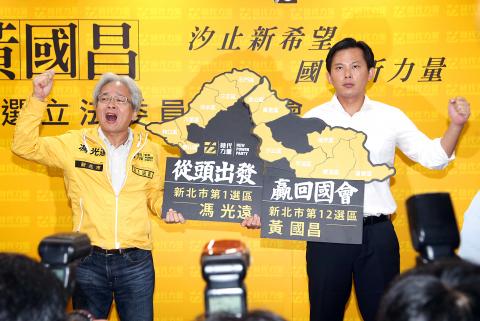Academia Sinica researcher Huang Kuo-chang (黃國昌) yesterday officially announced his candidacy for New Taipei City’s 12th constituency on the New Power Party ticket, promising to resign from his position with the nation’s top research institute before registering for the legislative elections.
“I would like to tell all my friends out there that I have decided to join politics by running for the legislative seat representing New Taipei City’s 12th constituency, which includes my hometown, Sijhih (汐止), as well as Rueifang (瑞芳), Jinshan (金山), Wanli (萬里), Pingsi (平溪), Shuangsi (雙溪) and Gongliao (貢寮) districts,” Huang said in a press conference at the Taiwan Presbyterian Church in Sijhih.
He said the nation is facing a multitude of crises: the Chinese threat, skyrocketing national debt, a pension system on the brink of bankruptcy, an unfair taxation system, low salaries, rising property prices and low food self-sufficiency.

Photo: CNA
“However, we do not see a government that can solve these problems; instead, we see collusions between the government and businesses, abuse of power and failed governance,” he said.
Huang said he decided to join the elections in the hopes of changing the legislature’s structure in his quest for a better future for the nation.
“We do not have a lot of time left; we must act now,” Huang said. “For the sake of Taiwan’s future, young people have stood up, university students have stood up and even high-school students have stood up’ now, it is time for me to stand up.”
Asked why he changed his mind after vowing last month that he would not run in the city’s 12th constituency and would throw his support behind Democratic Progressive Party (DPP) New Taipei City Councilor Shen Fa-hui (沈發惠), Huang said he had met with DPP election campaign strategy committee convener Su Jia-chyuan (蘇嘉全), who said that the DPP has decided not to nominate a candidate and to yield the constituency to Huang.

The Ministry of Economic Affairs has fined Taobao NT$1.2 million (US$36,912) for advertisements that exceed its approved business scope, requiring the Chinese e-commerce platform to make corrections in the first half of this year or its license may be revoked. Lawmakers have called for stricter enforcement of Chinese e-commerce platforms and measures to prevent China from laundering its goods through Taiwan in response to US President Donald Trump’s heavy tariffs on China. The Legislative Yuan’s Finance Committee met today to discuss policies to prevent China from dumping goods in Taiwan, inviting government agencies to report. Democratic Progressive Party Legislator Kuo Kuo-wen (郭國文) said

The Ministry of Economic Affairs has fined Taobao NT$1.2 million (US$36,900) for advertisements that exceeded its approved business scope and ordered the Chinese e-commerce platform to make corrections in the first half of this year or its license would be revoked. Lawmakers have called for stricter supervision of Chinese e-commerce platforms and more stringent measures to prevent China from laundering its goods through Taiwan as US President Donald Trump’s administration cracks down on origin laundering. The legislature’s Finance Committee yesterday met to discuss policies to prevent China from dumping goods in Taiwan, inviting government agencies to report on the matter. Democratic Progressive Party

Taiwan and its Pacific ally Tuvalu on Tuesday signed two accords aimed at facilitating bilateral cooperation on labor affairs, according to Taiwan’s Ministry of Foreign Affairs (MOFA). The governments inked two agreements in Taipei, witnessed by Foreign Minister Lin Chia-lung (林佳龍) and visiting Deputy Tuvaluan Prime Minister Panapasi Nelesone, MOFA said in a news release. According to MOFA, the agreements will facilitate cooperation on labor issues and allow the two sides to mutually recognize seafarers’ certificates and related training. Taiwan would also continue to collaborate with Tuvalu across various fields to promote economic prosperity as well as the well-being of their

Sung Chien-liang (宋建樑), who led efforts to recall Democratic Progressive Party (DPP) Legislator Lee Kun-cheng (李坤城), was released on bail of NT$80,000 today amid outcry over his decision to wear a Nazi armband to questioning the night before. Sung arrived at the New Taipei District Prosecutors’ Office for questioning in a recall petition forgery case last night wearing a red armband bearing a swastika, carrying a copy of Adolf Hitler’s Mein Kampf and giving a Nazi salute. Sung left the building at 1:15am without the armband and covering the book with his coat. Lee said today that this is a serious